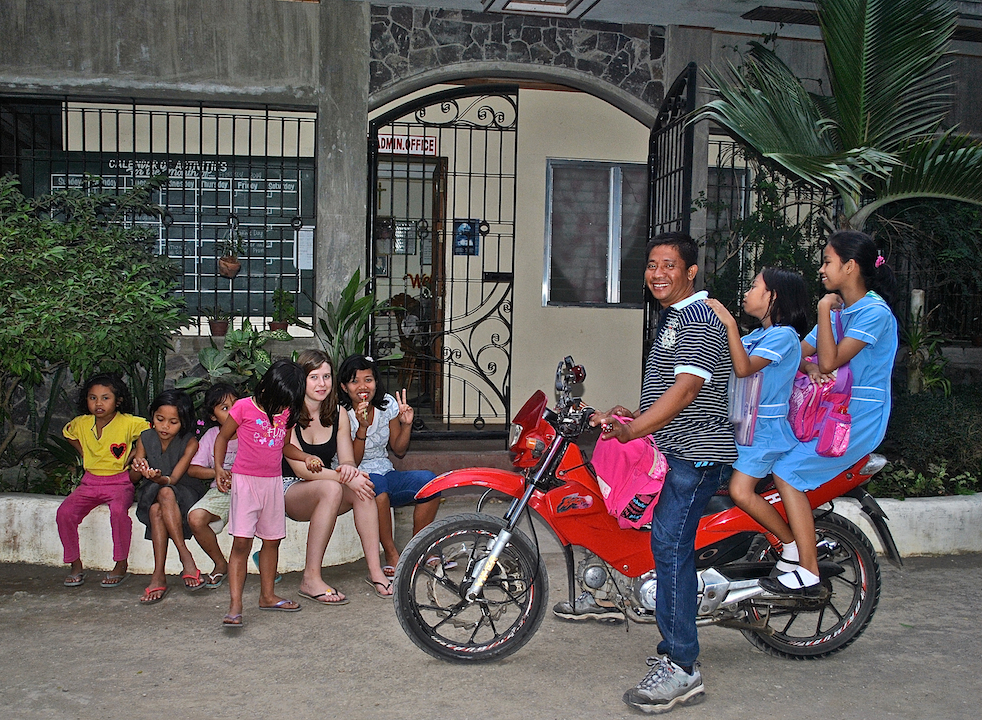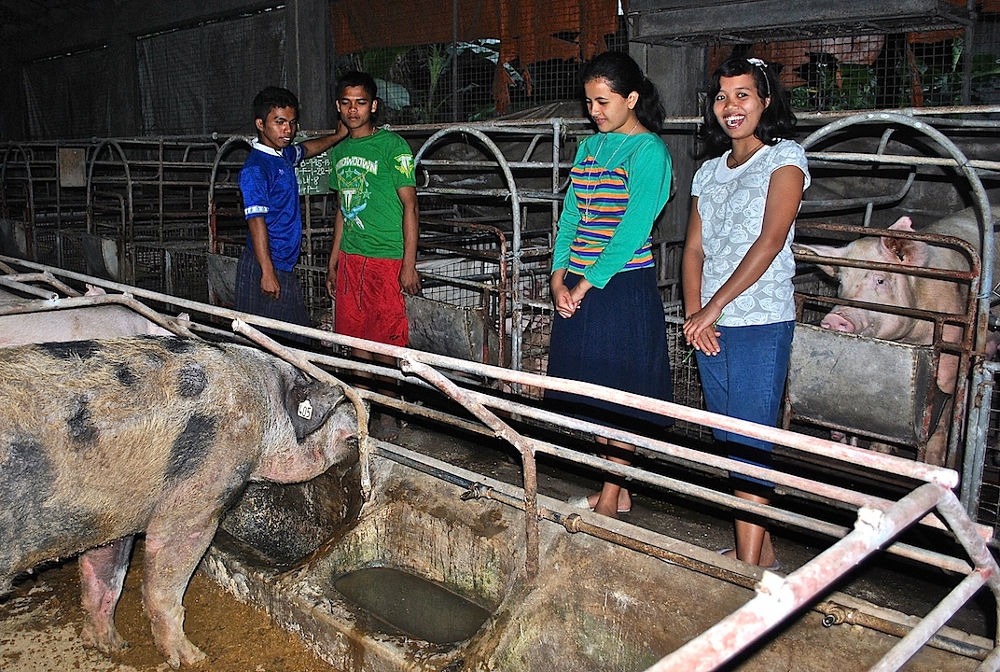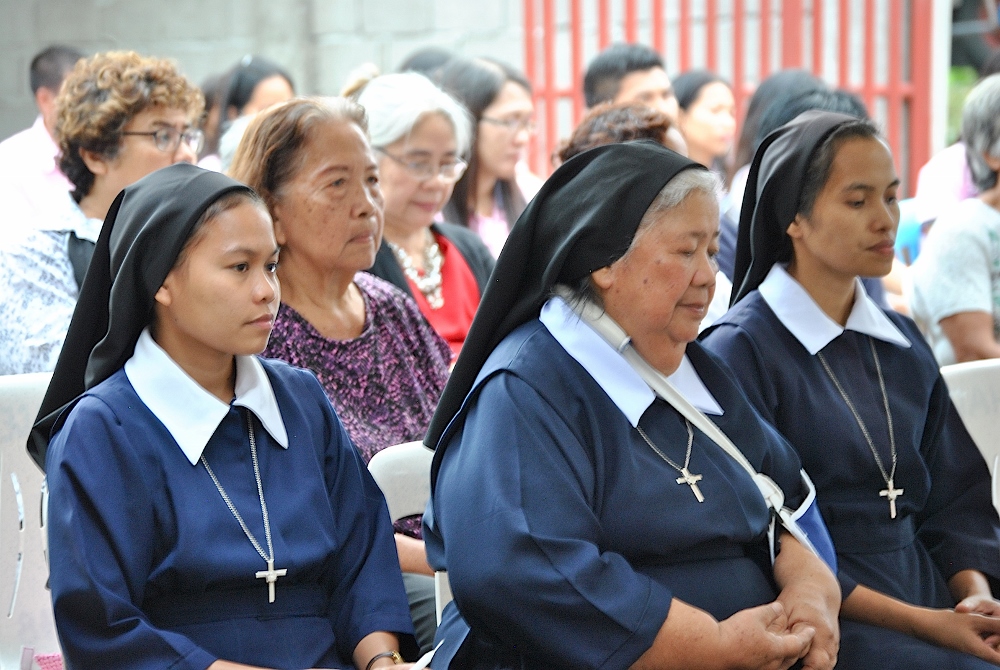
Iriga City, Philippines — The nun listened to her staff and men from an engineering school throw out ideas for building a biogas facility for a farm school where programs aim to help needy people gain control of their lives.
Sr. Felicitas De Lima sat with the four engineers from Central Bicol State University of Agriculture, and inspected drawings and the list they laid out on the long dining table of the building where the sisters live in Fatima Center for Human Development. She leaned back every now and then in deep thought before raising questions: how much gas can the facility produce, how many years' use will the center get out of it, and what is the realistic timetable for the project's completion?
Engineers sketched out how they would cement a compost pit that has been dug near the pens for 107 pigs and cover it to hold the gas produced from their waste. It "excited" De Lima of the Daughters of Saint Augustine that by early April workers were setting pipes that would bring the gas to the kitchen of the building where they were meeting in the 15-acre farm school that she directs here in Iriga City, southeast of Manila where the plan was hatched.
“I have to feed 125 children and young adults,” she told NCR. Turning pig waste into fuel would reduce the cost of feeding the young people who live in Fatima. Many of them study at the farm school there or at partner colleges and universities in Camarines Sur province. Local schools help the students by giving scholarships and volunteering services to the center, and a few donors pledge money for tuition fees. Live-in students who are in primary through high school grow plants and raise animals for food, while older students work part-time to raise money for school expenses.
“We do not want to beg,” De Lima told NCR. “We want to teach our students how they can work their way out of poverty, and how they, too, can help others in need once they are already earning a living,” she added.
The biogas project is one way Fatima Center can achieve this. Aside from cutting cooking costs, it could also help college students who earn money from selling banana chips and other food products they make there, the nun explained.

College students planning to open a low-cost breakfast canteen nearby for public pedicab drivers could benefit also. They aim to run the canteen as a cooperative, which any of them can join, along with other students living around Fatima who want to pitch in work hours and share earnings.
Missionary for the poor
Helping the poor has been De Lima’s preoccupation since she began considering becoming a nun.
“I heard about nuns working in mission in Africa and wanted so much to join them” the 77 year-old director said.
Her priest adviser, however, suggested she join Order of Saint Augustine (OSA), which ran a college in the city. She joined the order soon after she graduated with a bachelor’s degree in education. (The order has since been renamed Augustinian Sisters of Our Lady of Consolation.)

After teaching in and directing schools of the order, she and fellow Augustinian Sr. La Salle Baysa were allowed to join the Rural Missionaries of the Philippines in 1970. They lived and worked on Negros Island, central Philippines, among sugar plantation workers who were growing restive over “unjust wages and other agrarian, labor and social justice issues,” De Lima recalled. The exposure to “injustice” in the system intensified her need to work more directly with the poor. “The experience affirmed the call I have heard since childhood to be a missionary,” De Lima told NCR.
But this period of “greatest joy” of her religious life was also a time of tension with the OSA leadership. In 1975 their superior allowed De Lima and Baysa to work at Fatima Center in one of the country’s poor regions, instead of the order’s exclusive schools “catering to rich families,” De Lima said.
De Lima's father, who had pushed his children to give back to the community from their material wealth and their talents, gave her the land that she and Baysa could develop into home, food source and development center for scores of people comming to the nuns they heard help the poor.
By 1980, though, the sisters were called to leave the Rural Missionaries and “return to the convent” and resume school work, the order’s main apostolate, which they had trained for in college. The superior denied their plea to develop Fatima as an OSA community and directed them to take up assignments given to them if they wanted to remain with the order.
“Sister La Salle and I had to leave,” De Lima told NCR.
They left in 1992 and decided to form a congregation of women religious in Iriga. The congregation was to be linked to the Archdiocese of Caceres whose bishop at that time was guiding their discernment process and later, their exit from their order. The pair agreed De Lima would direct their social apostolate, and Baysa would take charge of vocation promotion and sister formation.
After formal dispensation from vows with the Order of St. Augustine in 1993, Caceres Archbishop Leonardo Legaspi helped them establish their congregation named Daughters of Saint Augustine.
Bishop Jose Rojas, Jr., of neighboring Libmanan Diocese last February inaugurated the new congregation’s Our Lady of Good Counsel Novitiate and assumed responsibility for overseeing religious training and spiritual direction of the seven members. Before then the nuns lived in Fatima Center and devoted most of their time to helping to run it.
Now they can pull away for prayer and religious community building as well as help Libmanan Diocese’s social apostolate to parishioners. Teachers and staff members, including former residents, are taking on teaching, supervision and program implementation tasks.
Doing God’s work
De Lima at various points in the past decades wondered whether she could carry on the mission to the poor and to build a religious order, especially after Baysa died in 2005.
“I told Monsignor (Rojas) I’m not really a formator. I’m a grassroots social worker. The formator is Sr. La Salle. Unfortunately she passed away. I didn’t know what to do, and once I even came to exploring with the sisters affiliating with other established religious communities around us,” the nun said.
She remembers telling herself during these times that she was just doing God's work and that because of this, he would surely provide her what she needed to do it right.
Through it all, success stories soothe “heartaches,” she said. On top of the list are the children who were born in Fatima and who “all turned out bright and talented,” she told NCR.
She remembers the “many women” who have come to Fatima wanting to end their pregnancies so they could work. De Lima asks would-be mothers not to abort their babies and offers to care for them in Fatima.
She encourages women to stay in the center where they can get needed pre-natal care and nutrition. She also invites them to take care of their children for at least six months, and if they prefer to put their child up for adoption, suitable families are sought. Legalities are worked out through the Department of Social Welfare and Development (DSWD).
Most of these mothers have left, gotten sick or died eventually. The children they left in Fatima Center, if not adopted, continue to live in the farm. They are placed in school and receive some vocational or career training. After college, they can stay and work in Fatima or move elsewhere.
Many graduates do work in the Fatima Integrated Farm School built to teach 400 students from primary to high school. Teachers and volunteers also go to the order’s Maryhill upland community to teach indigenous Agta families there and provide healthcare and other services.
“Our teachers now are former wards who have finished education,” De Lima said proudly. These graduates and others with various skills, such as in automotive repair and commercial cooking, have taken their government competency tests that prove their qualifications to teach or work. There was even a group of young women training as welders who easily found jobs after training.
Because the residents’ training includes values promoted by Fatima, De Lima believes they have more to offer no matter where they land a job. “As teachers here, they really have zeal,” she said.
They also show concern for others. One teacher donates part of his salary to Fatima’s scholarship program. Others who have left also come back and host Christmas programs and parties for people living in Fatima. Others working in resorts, restaurants or hotels around the country or in the Middle East also occasionally send back money for the children. There are some, however, who have established their own businesses but never returned or offered help, De Lima added sadly.
Fatima Center is supported by German volunteer workers from Kolping Youth Community Services, Canadian Feed the Children agency, which sends breakfast cereal, beans, cereal bars, food and other items, and by local and foreign individuals of various faiths.
De Lima's siblings and relatives offer material support and guidance, not only to the nun, but to the religious community she has formed.
“My feeling is that the strength of Fatima Center lies on the fact that there are sisters,” De Lima said. Without DSA, benefactors might wonder how their contributions will be used. “One benefactor has already asked me what will happen to this project if I'm out of it. I told them the sisters will continue,” De Lima explained.
[N.J. Viehland is an NCR correspondent based in the Philippines.]

